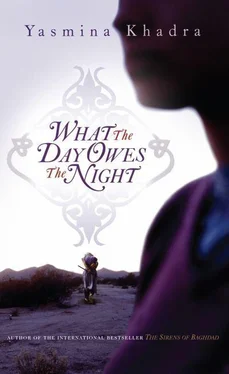Émilie stared at me, wondering if I were really flesh and blood.
‘It’s me.’
‘And . . . ?’
Her face was a mask of bronze, a cloudy mirror; I could never have believed she could react to my presence with such indifference.
‘I’ve looked for you everywhere.’
‘Why?’
The question caught me unawares. I lost the power of speech. How could she not see what was staring her in the face? I was reeling, like a punch-drunk boxer. I was dumbstruck. I did not know what to do now.
‘What do you mean, why?’ I heard myself stammer. ‘The only reason I am here is because of you.’
‘We said everything we had to say back in Oran.’
She was perfectly still, only her lips moved.
‘Things were different in Oran.’
‘Oran, Marseille, it’s all the same.’
‘You know that’s not true, Émilie. The war is over, life goes on.’
‘For you, maybe . . .’
I was sweating now.
‘I really thought that—’
‘Then you were wrong.’ She cut me off.
Her coldness froze my thoughts, my words, my soul.
‘Émilie . . . tell me what I have to do, but please, don’t look at me like that. I’d give anything to—’
‘You can only give what you have. Sometimes not even that, and you don’t have anything. . . Besides, what good would it do? We can’t solve the problems of the world, and it has taken much more from me than it can ever repay.’
‘I’m so sorry.’
‘They’re just words. I think I told you that before.’
My grief was such that it filled my whole being; there was no room left for anger or resentment.
Against all expectations, her dark look softened and her features relaxed. She stared at me for a long time as though she were going far back into the past to find me. Finally she came towards me, her perfume hanging heavy in the air. She took my face in her hands the way my mother used to do to kiss me on the forehead. Émilie did not kiss me on the forehead, or on the cheek; she simply stared at me. Her breath mingled with mine. I wanted her to hold my face like this until the Last Judgement.
‘Nobody is to blame, Younes. You don’t owe me anything. It’s just the way the world is, and I don’t want that any more.’
She turned and walked away.
I stood on the pavement, speechless, frozen, and watched her walk out of my life.
It was the last time I ever saw her.
That night I took the boat back to Algeria, and not until today did I set foot in France again.
I wrote letters to her, sent her cards for her birthday and every holiday . . . Not once did she reply. I told myself she had moved, that she had gone away, as far away as she could from her memories of me, and that perhaps it was for the best. I missed her terribly, thought about the life we might have made together, the wounds we might have healed and those that would have healed themselves in time, the old demons we would have exorcised. Émilie had nothing she wanted to save, no page to turn, no pain she needed to grieve over. The few moments she had granted me on that pavement beneath the blazing sun had been enough for me to realise that there are doors that, once they close upon some sorrow, become an abyss that even the light of heaven cannot penetrate. For a long time I suffered over Émilie; I felt her pain, her self-denial, her decision to live shut up in her own tragedy. Later I tried to forget her, hoping to temper the pain in both of us. I had to accept it, had to confront what my heart stubbornly refused to face. Life is a train that stops at no stations; you either jump aboard or stand on the platform and watch as it passes, and there is nothing sadder than an abandoned station. Was I happy after that? I think so. I experienced moments of pleasure, moments of unforgettable joy; I loved again and dreamed again like a wide-eyed boy. And yet I always felt that there was something missing, something that left me somehow crippled, in short that I only ever hovered on the fringes of happiness.
The plane lands on the tarmac in a roar of the reverse thrust of the engines. The boy next to me points to the planes waiting to take off. Over the speakers, a flight attendant’s voice tells us the temperature outside, the local time, and thanks us for choosing Air Algérie, before insisting that we remain seated with our seat belts fastened until the plane comes to a complete stop.
The teenager carries my hand luggage and gives it back to me when we reach immigration. After the official formalities, he points me to the exit, apologising that he has to wait for his luggage.
The frosted glass door into the arrivals hall slides back. Behind the yellow line, people are waiting impatiently to recognise a familiar face among the stream of arriving passengers. A little girl lets go her of father’s hand, runs up and throws herself into the arms of a granny wearing a djellaba. A young woman is plucked from the crowd by her husband, who kisses her chastely on both cheeks, but there is passion in their eyes.
A man of about fifty stands off to one side holding a sign marked ‘Río Salado’. For a second it is like seeing a ghost. He is the image of Simon: short, stocky, pot-bellied and bow-legged, his hair already receding. And his eyes are Simon’s eyes; those eyes that immediately recognise me – how can he spot me in this crowd when we have never met before? The man gives me a little smile, comes over and holds out a chubby hand exactly like his father’s.
‘Michel?’
‘That’s me, Monsieur Jonas. Pleased to meet you. Did you have a good flight?’
‘I slept for a bit.’
‘Have you got any luggage?’
‘Just this bag.’
‘Okay. My car is in the car park.’ He takes the bag and gestures for me to follow him.
Slip roads branch out dizzyingly ahead of us. Michel drives fast, eyes fixed on the road ahead. I don’t dare to turn and look at him; I simply see his face in profile. It is astonishing how much he looks like Simon, my old friend, his father. My chest tightens at the fleeting memory. I take a deep breath to expel the poison suddenly seeping through me. Focus on the road as it whips past, on the shimmering sunlight of the cars as they weave, on the road signs flashing past above our heads: Salon de Provence, straight ahead, Marseille, bear right at next exit; Vitrolles, next exit . . .
‘I expect you’re hungry, Monsieur Jonas. I know a nice little bistro . . .’
‘That’s all right, they served us dinner on the plane.’
‘I’ve booked you into the 4 Dauphins, not far from the Cours Mirabeau. You’re lucky, apparently it’s going to be sunny all week.’
‘I’ll only be staying for a couple of days.’
‘Everybody’s waiting to see you. Two days will never be enough.’
‘I have to get back to Río Salado. My grandson is getting married . . . I wanted to come earlier, to be at the funeral, but getting a visa in Algiers is a devil of a job. I had to get friends in high places to put in a word . . .’
The car hurtles into a tunnel beneath a vast fortress of glass and steel that seems to surge from nowhere.
‘It’s the Aix-en-Provence TGV station,’ Michel explains.
‘But we’re not in the city.’
‘The station is on the outskirts. It’s only been open five or six years. The town is about fifteen minutes away. Have you ever been to Aix, Monsieur Jonas?’
‘No . . . In fact I’ve only ever been to France once. To Marseille in March 1964. I arrived at night and left the following night.’
‘Just a flying visit?’
‘You could say that.’
‘Deported?’
‘Rejected.’
Michel looks at me, puzzled.
‘It’s a long story,’ I say, to change the subject.
We drive through a commercial district full of hypermarkets, shopping centres and underground car parks. Huge neon signs vie with billboards and a sea of people streams around the shops and the markets. There is a traffic jam at the exit and the tailback is half a mile long.
Читать дальше












